
Summary
The Kv1.3 potassium channel is involved in several human diseases and has therefore become a therapeutic target for the treatment of these diseases. Interestingly, the venoms of animals such as scorpions, spiders, and cone snails contain some of the most potent molecules ever found that can inhibit the Kv1.3 channel. These molecules are peptidic toxins that, once isolated, require biochemical and biological characterization. However, the complexity of isolating these molecules from venom, as well as the small amount that is recovered, requires that methods such as chemical synthesis or recombinant protein production be used to produce larger quantities of these toxins. In this work, Jesús Borrego and colleagues developed a method for the recombinant production of three potent Kv1.3 channel inhibitors using the recombinant expression system Pichia pastoris (yeast). The peptides Vm24, AnTx, and Ts6 were recombinantly expressed, purified, and characterized. The three recombinant peptides showed similar properties to the peptides isolated directly from the venom (native peptide). These recombinant expression systems facilitate the exploration of new applications of these inhibitors and enable the development of new drugs for the treatment of diseases involving the Kv1.3 channel.
(DOI: https://doi.org/10.3390/jof8111215).